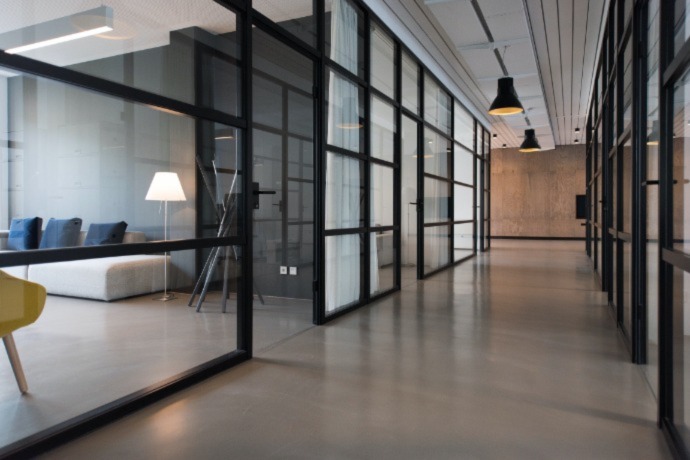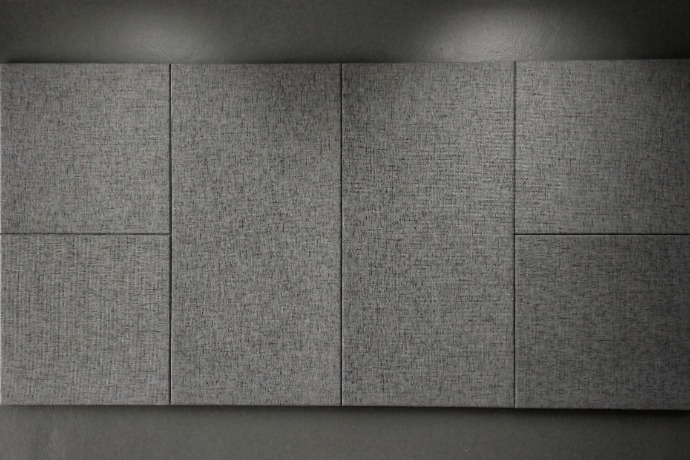August 23, 2023
Picture this: You step into a bustling commercial building, filled with the hum of conversations, the clickety-clack of keyboards, and the occasional phone ringing off the hook. While the energy is palpable, there's something missing—a sense of quiet calmness that can make all the difference in creating a truly productive environment.
That's where soundproofing comes in. By embracing soundproofing techniques and incorporating high-quality materials like acoustic insulation, double-glazed windows, and sound-absorbing panels, you have the power to transform your commercial space into a serene sanctuary.
The Importance of Soundproofing

We’ve all gone out to eat at a nice restaurant, only to be disappointed that we can’t hear the person sitting right next to us. It’s an incredibly frustrating experience– and it doesn’t just happen at restaurants. Loud cafes, offices, healthcare facilities, and public spaces can feel overwhelming and distracting.
In commercial buildings, excessive noise can have detrimental effects on productivity, concentration, and overall well-being of the occupants inside. Employees can’t work as well, and it can cloud people’s minds. Excessive noise indoors can also lead to increased stress levels, reduced focus, and decreased work efficiency. If you want to optimize the efficiency and comfortability of your space, soundproofing is critical.
Moreover, unwanted noise can disrupt meetings, conversations, and client interactions, tarnishing the professional image of the business. It’s about more than just comfort; it’s also about the well-being of the people who enter your building and the well-being of your brand.
Read on to learn more about how to get started with soundproofing your commercial building, including an overview of what materials are out there, and various techniques to reduce sound levels.
Soundproofing Techniques
Acoustic Insulation
Acoustic insulation can help reduce sound transmission in a commercial space by soaking it all up. It involves using dense materials with sound-absorbing properties to create a barrier against sound waves. Fiberglass insulation, cellulose insulation, and rock wool are commonly used materials for acoustic insulation. By installing them in walls, ceilings, and floors, you can significantly reduce sound transmission.
Double-Glazed Windows

Windows are notorious for letting unwanted noise seep into commercial buildings from the street. Ever had an ambulance or firetruck interrupt a work call?
One effective solution is to install double-glazed windows. These windows consist of two glass panes separated by a layer of air or gas, which acts as a buffer against sound waves.
Double-glazed windows can also help improve thermal insulation and energy efficiency, saving your company money in the long run. They tend to be more environmentally friendly because of this, as well! Double-glazed windows are definitely an excellent option to consider, although they may be more expensive than some other soundproofing options.
Using Sound-Absorbing Materials
Using sound-absorbing materials in strategic locations can help minimize noise reverberation and echo. These materials absorb sound waves, preventing them from bouncing off hard surfaces and amplifying the noise.
Some popular options include acoustic panels, foam panels, and fire-resistant wool insulation. These materials can be applied to walls, ceilings, and floors to create a more acoustically balanced environment. The more sound-absorbing materials there are, the less sound there will be bouncing around the walls and echoing into your ears!
Best Sound-Absorbing Materials

Acoustic Panels
Acoustic panels are a super common and stylish soundproofing option. These panels are made of materials with excellent sound absorption properties, such as fabric-covered fiberglass or perforated wood. They are available in various designs and can be easily mounted on walls or ceilings. You may have seen them in your favorite restaurant or cafe, blending into the walls’ design.
Acoustic panels are great because they tend to enhance the overall aesthetics of any given space. They come in a wide range of options, with choices ranging from sleek and modern designs to customizable panels that can be printed with artwork or company branding. This ensures that the panels will add a touch of style and personality to your commercial space.
Foam
Foam is a popular choice for soundproofing due to its lightweight and easy-to-install nature. It is highly effective in absorbing high-frequency sounds and reducing echo. Foam panels or foam tiles can be applied to walls and ceilings. They come in different shapes, sizes, and densities, allowing for customization based on your specific requirements.
Fire-Resistant Wool Insulation
When it comes to soundproofing in commercial buildings, fire safety is of paramount concern. Fire-resistant wool insulation, such as mineral wool or glass wool, offers excellent sound absorption properties, while still providing fire protection.
These materials are non-combustible and can be safely used in walls, ceilings, and floors to enhance soundproofing while meeting fire safety regulations.
Underlayment
Underlayment is commonly used in commercial buildings to reduce impact noise, such as footsteps or furniture movement. It is typically installed beneath flooring materials, acting as a sound barrier between the subfloor and the finished floor. High-density underlayment is often made of materials like rubber or cork.
Sealant
To achieve comprehensive soundproofing, you’ll have to seal any gaps or cracks that may allow noise to seep through. Acoustic sealants can be used to seal joints, seams, and gaps around windows, doors, and other building components.
By eliminating these potential sound leaks, you can significantly enhance the overall soundproofing effectiveness.
Weighing Your Soundproofing Options
When considering insulation options, it's important to weigh the pros and cons of each type. Fiberglass insulation, a popular choice, offers good thermal and acoustic performance, is cost-effective, and is readily available. However, it can be irritating to the skin and respiratory system during installation, requiring proper protective measures.
Cellulose insulation, made from recycled paper, provides excellent sound absorption and thermal properties while being eco-friendly. But, it may be more prone to settling over time.
Mineral wool insulation offers superior fire resistance and sound absorption, but it can be heavier and more expensive compared to other options. On the other hand, spray foam insulation provides exceptional air sealing and thermal performance, but can be more costly.
When it comes to making informed decisions about all of these options, reaching out to DeLeers Construction is a wise move. With our expertise in construction and soundproofing solutions, we can provide valuable guidance and recommendations tailored to your specific needs.
Whether you're seeking advice on materials or installation, our team of professionals can offer insights, suggest the best options available, and help you create a peaceful and productive environment that aligns with your vision.
Message or call our experts at 920-347-5830 with any questions about hiring professionals for commercial space renovation or building!



